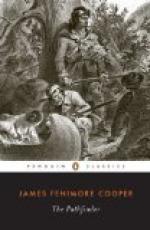“Listen to one who has had a long acquaintance with red natur’, though he has a white birth and white gifts. When the Manitou of a pale-face wishes to produce good in a pale-face heart He strikes it with grief; for it is in our sorrows, June, that we look with the truest eyes into ourselves, and with the farthest-sighted eyes too, as respects right. The Great Spirit wishes you well, and He has taken away the chief, lest you should be led astray by his wily tongue, and get to be a Mingo in your disposition, as you were already in your company.”
“Arrowhead was a great chief,” returned the woman proudly.
“He had his merits, he had; and he had his demerits, too. But June you are not desarted, nor will you be soon. Let your grief out — let it out, according to natur’, and when the proper time comes I shall have more to say to you.”
Pathfinder now went to his own canoe, and he left the island. In the course of the day June heard the crack of his rifle once or twice; and as the sun was setting he reappeared, bringing her birds ready cooked, and of a delicacy and flavor that might have tempted the appetite of an epicure. This species of intercourse lasted a month, June obstinately refusing to abandon the grave of her husband all that time, though she still accepted the friendly offerings of her protector. Occasionally they met and conversed, Pathfinder sounding the state of the woman’s feelings; but the interviews were short, and far from frequent. June slept in one of the huts, and she laid down her head in security, for she was conscious of the protection of a friend, though Pathfinder invariably retired at night to an adjacent island, where he had built himself a hut.
At the end of the month, however, the season was getting to be too far advanced to render her situation pleasant to June. The trees had lost their leaves, and the nights were becoming cold and wintry. It was time to depart.
At this moment Chingachgook reappeared. He had a long and confidential interview on the island with his friend. June witnessed their movements, and she saw that her guardian was distressed. Stealing to his side, she endeavored to soothe his sorrow with a woman’s gentleness and with a woman’s instinct.
“Thank you, June, thank you!” he said; “’tis well meant, though it’s useless. But it is time to quit this place. To-morrow we shall depart. You will go with us, for now you’ve got to feel reason.”
June assented in the meek manner of an Indian woman, and she withdrew to pass the remainder of her time near the grave of Arrowhead. Regardless of the hour and the season, the young widow did not pillow her head during the whole of that autumnal night. She sat near the spot that held the remains of her husband, and prayed, in the manner of her people, for his success on the endless path on which he had so lately gone, and for their reunion in the land of the just. Humble and degraded as she would have seemed in the eyes of the sophisticated and unreflecting, the image of God was on her soul, and it vindicated its divine origin by aspirations and feelings that would have surprised those who, feigning more, feel less.




